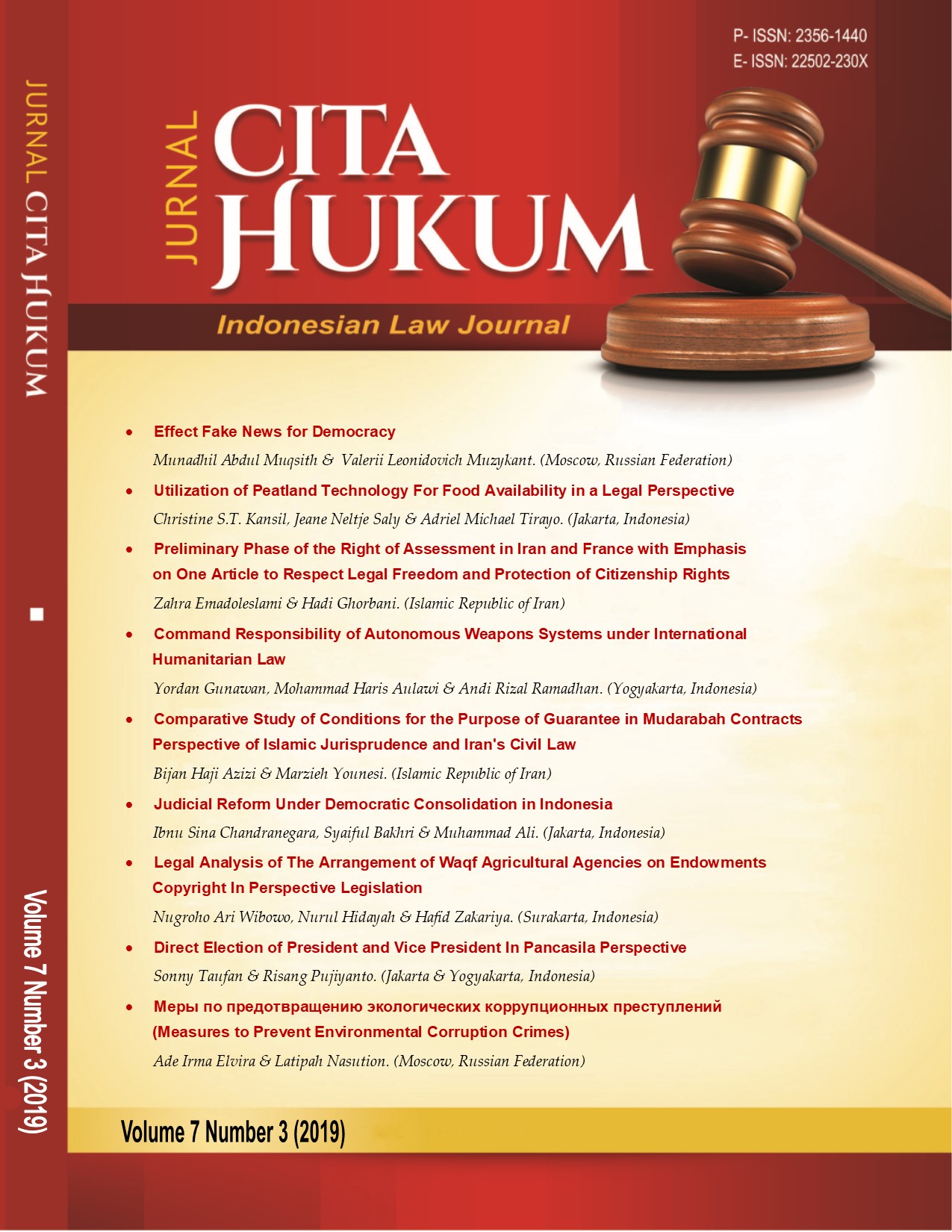Viewpoints on Ruling by Law in The Philosophical Thought of Han Fei Tzu
DOI:
https://doi.org/10.15408/jch.v12i1.38903Keywords:
Han Fei Tzu, Rule of Law, Philosophical ThoughtAbstract
During the Spring Autumn and Warring States periods, when Chinese society was in chaos and instability, Han Fei Tzu proposed a comprehensive view that law is the most effective tool to bring peace, stability, and justice. This approach, which stands in stark contrast to the contemporary emphasis on morality and virtue in governance, holds relevance even in modern times. The primary aim of this study is to elucidate the role of law in politics from a philosophical perspective, with a specific focus on Han Fei Tzu's thoughts on the application of law as the primary instrument in state governance. The study employs a qualitative method, comprising two main approaches: the literature approach and the law approach. The literature approach is used to analyze classical texts and philosophical works that discuss Han Fei Tzu's thoughts on law and governance, and to review modern academic literature that either supports or criticizes his views. Meanwhile, the law approach is used to assess how Han Fei Tzu's proposed concept of law can be implemented in the context of governance and whether its application aligns with modern legal theory. The findings underscore the importance of Han Fei Tzu's thoughts on law, which stress the need for consistency between theory and practice, and the comprehensive enforcement of law without any discrimination. His thinking also underscores the significance of law as a tool of social control that is not contingent on individual morality, but on absolute obedience to the rules set by the state. The study raises several critical questions about the relevance of Han Fei Tzu's views in the context of modern politics, and offers recommendations for further research on the role of law in achieving sustainable political stability.
References
Börzel, T. A., & Zürn, M. (2021). Contestations of the liberal international order: From liberal multilateralism to postnational liberalism. International organization, 75(2), 282-305. https://doi.org/10.1017/S0020818320000570
Brennan, T. (2022). Teaching by Contradictions: Montesquieu's Subversion of Piety in The Spirit of the Laws. The Review of Politics, 84(4), 520-544. https://doi.org/10.1017/S0034670522000651
Chaisse, J., & Dimitropoulos, G. (2021). Special economic zones in international economic law: towards unilateral economic law. Journal of International Economic Law, 24(2), 229-257. https://doi.org/10.1093/jiel/jgab025
Coll, A. R. (2021). Philosophical and Legal Dimensions of the Use of Force in the Falklands War. In The Falklands War (pp. 34-51). Routledge.
Cotesta, V. (2021). Legalism: How to Create a Well-Ordered Society. In The Heavens and the Earth: Graeco-Roman, Ancient Chinese, and Mediaeval Islamic Images of the World (pp. 247-257). Brill. https://doi.org/10.1163/9789004464728_021
Ekardt, F., & Ekardt, F. (2020). Ethics and Law of Sustainability–Especially of Freedom, Human Rights, Democracy, and Balancing in a Reinterpreted Perspective. Sustainability: Transformation, Governance, Ethics, Law, 111-223. https://doi.org/10.1007/978-3-030-19277-8_3
De la Porte, C., & Jensen, M. D. (2021). The next generation EU: An analysis of the dimensions of conflict behind the deal. Social Policy & Administration, 55(2), 388-402. https://doi.org/10.1111/spol.12709
Flanagan, B., & Hannikainen, I. R. (2022). The folk concept of law: Law is intrinsically moral. Australasian Journal of Philosophy, 100(1), 165-179. https://doi.org/10.1080/00048402.2020.1833953
Gilmullin, A. R., & Oksamytny, V. V. (2022). The Development of Philosophical and Legal Ideas about Legal Laws in the Teachings of German Classical Philosophy (Kant, Fichte, Hegel). BiLD Law Journal, 7(2s), 206-212.
Hillier, J., & Cao, K. (2023). Towards a new ‘old’ theory for planning in China: The potential of Huang-Lao thought. Planning Theory, 22(4), 380-403. https://doi.org/10.1177/14730952231163246
Hu, H., & Hu, H. (2021). Governing the Public—Management to Others. Principles of Chinese Management, 225-266. https://doi.org/10.1007/978-981-33-6522-3_7
Hu, H., & Hu, H. (2021). Situational Governance-Management of Specific Situation. Principles of Chinese Management, 343-381. https://doi.org/10.1007/978-981-33-6522-3_10
Kallinikos, P. (2023). Political Realism in the Chinese Warring States Period and the European Renaissance: Han Fei and Machiavelli. Conatus-Journal of Philosophy, 8(1), 127-166. https://doi.org/10.12681/cjp.29669
Liang, L. (2023). The Fable of the Public Welfare Competition Recorded in Han Feizi and Its Implied" Public Opinion Theory". Frontiers of History in China, 18(1). https://doi.org/10.3868/s020-012-023-0002-6
Luo, G. (2023). Taoist Ethics of “Nonaction” and “Detached from Righteousness and Benefit.” In Traditional Ethics and Contemporary Society of China (pp. 175-215). Singapore: Springer Nature Singapore. https://doi.org/10.1007/978-981-99-0256-9_6
Marshev, V. I., & Marshev, V. I. (2021). The Origins of Management Thought: From Fifth Millennium BC to the Fifth Century. History of Management Thought: Genesis and Development from Ancient Origins to the Present Day, 77-152. https://doi.org/10.1007/978-3-030-62337-1_2
Martin, G. T. (2021). Power, Justice, and Freedom. The Links Between Global Democracy and Human Liberation. Journal of Globalization Studies, 12(1), 3-17. https://doi.org/10.30884/jogs/2021.01.01
Michener, J., & Ford, T. N. (2023). Racism and health: three core principles. The Milbank Quarterly, 101(Suppl 1), 333. https://doi.org/10.1111/1468-0009.12633
Mintarsih, M., & Sukamto, B. (2020, March). Natural rights in relation to freedom of democracy. In International Conference on Law Reform (INCLAR 2019) (pp. 95-99). Atlantis Press. https://doi.org/10.2991/aebmr.k.200226.019
Munte, A. (2022, August). Philosophy of Giorgio Agamben-Homo Sacer's on the Independent Curriculum for Learning in Indonesia: Critical Reflection. In International Seminar Commemorating the 100th Annniversary of Tamansiswa (Vol. 1, No. 1, pp. 464-468).
Nedelea, M. O. (2022). The role of legalism in the development of Chinese law. In Development Through Research and Innovation-2022 (pp. 67-76). https://doi.org/10.53486/dri2022.06
Petersen, F. (2023). Montesquieu and the Concept of the Non-Arbitrary State. The European Legacy, 28(1), 25-43. https://doi.org/10.1080/10848770.2022.2106638
Saleh, J., Amri, N., Kamal, M., Abdullah, A., & Mukhtar, M. (2022). Marriage Guidance Towards Family Resilience in Aceh: A Study of Islamic Law Philosophy. Samarah: Jurnal Hukum Keluarga dan Hukum Islam, 6(2), 594-613.
Santoni de Sio, F., & Mecacci, G. (2021). Four responsibility gaps with artificial intelligence: Why they matter and how to address them. Philosophy & Technology, 34(4), 1057-1084. https://doi.org/10.1007/s13347-021-00450-x
Spector, C. (2023). Montesquieu. In Handbook of the History of the Philosophy of Law and Social Philosophy: Volume 1: From Plato to Rousseau (pp. 249-257). Cham: Springer International Publishing. https://doi.org/10.1007/978-3-031-19542-6_33
Suresh, P. (2022). Political Leadership in China: A Historical Perspective. In Foreign Policy of China Under Deng Xiaoping: Contemporary Relevance and Continuity (pp. 55-101). Singapore: Springer Nature Singapore. https://doi.org/10.1007/978-981-19-4764-3_3
Taekema, S. (2021). Methodologies of rule of law research: why legal philosophy needs empirical and doctrinal scholarship. Law and philosophy, 40(1), 33-66.
https://doi.org/10.1007/s10982-020-09388-1
Tănăsescu, M. (2020). Rights of nature, legal personality, and indigenous philosophies. Transnational environmental law, 9(3), 429-453. https://doi.org/10.1017/S2047102520000217
Tobia, K. (2024). Legal concepts and legal expertise. Synthese, 203(4), 107. https://doi.org/10.1007/s11229-024-04512-3
Van Dung, V., & Hoa, L. M. (2023). Theoretical Perspectives of the View of Human in the Confucian Philosophy in Pre Qin Dynasty.https://doi.org/10.24204/ejpr.2021.4022
Wäscher, S., & Deplazes‐Zemp, A. (2020). Freedom of research in a democratic society: Is there a contradiction between socially desirable science and freedom of research? EMBO reports, 21(6), e49928. https://doi.org/10.15252/embr.201949928
Yuxi, F. E. N. G. (2022). Ancient China and the Responsibility to Protect: An Under-Studied Topic of Legal History. Asian Journal of International Law, 12(2), 342-369. https://doi.org/10.1017/S2044251322000054











